4Alpha Research researcher: 0xamuel
Recently, The Nakamoto Project released a research report on U.S. Bitcoin holders. The report analyzes U.S. Bitcoin adoption in terms of demographics, political leanings, and moral underpinnings, aiming to explore other factors beyond standard demographics that may influence Bitcoin holdings and attitudes.
Key points summary
Young men are more likely to hold Bitcoin: Bitcoin holders are generally younger and more likely to be male, but in other aspects such as race, ethnicity, income , education, and financial literacy, they are generally similar to the U.S. population.
Bitcoin holdings have nothing to do with politics: Although attitudes towards Bitcoin vary significantly between political parties in the United States, The Nakamoto Project anticipates that this difference could lead to extreme As a result, conservatives and liberals, for example, may prefer to hold Bitcoin. However, the findings showed no significant relationship between Bitcoin holdings and political leanings. The number of Bitcoin holders in the United States is roughly the same across political backgrounds.
Bitcoin Holders’ Values: A survey using Moral Foundations Theory The values and identity of Bitcoin holders. The results showed that Bitcoin holdings were not significantly related to specific moral foundations. In contrast, Bitcoin holdings are more affected by the understanding of the Bitcoin concept, recognition of its protocol and assets, and the ethical perception of Bitcoin.
Research background
Although Bitcoin has become a household name, information about Bitcoin holders is relatively limited. Although about 95% of Americans are aware of the concept of Bitcoin and about 1/7 of Americans currently own Bitcoin, detailed data is still scarce.
Although other institutions have conducted studies in similar directions, these studies often have limitations, such as small sample sizes, overly broad scope, or focusing on only a few indicators. Additionally, most studies primarily discuss cryptocurrencies as a whole rather than focusing on Bitcoin. Therefore, The Nakamoto Project specifically focuses on Bitcoin in this report and limits the scope of the study to the United States.
To explore the adoption of Bitcoin in the United States, The Nakamoto Project partnered with Qualtrics to survey 3,538 adult Americans. The survey was designed to gather information about respondents’ demographics, moral leanings and attitudes toward Bitcoin. Data collection was divided into two phases: an initial sample was collected in November 2023, containing a total of 3,022 respondents; a supplemental sample was collected in March 2024, adding 516 respondents, and focused on exploring the impact of Bitcoin ETFs on The impact of public perception.
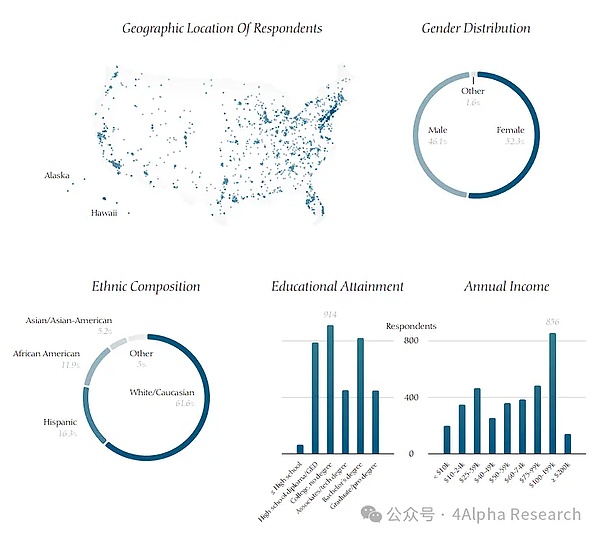
Demographic analysis
Research by The Nakamoto Project found that the group of Bitcoin holders in the United States is very diverse. There were no significant differences between Bitcoin holders and non-holders in terms of race, ethnicity, religion, marital status, income, education level, or financial literacy. From a demographic perspective, the two groups perform similarly on most measures. However, Bitcoin holders differ significantly in terms of age and gender:They tend to be younger andmaler .
The chart below shows the proportion of Bitcoin holders by gender and age. A survey by Block found that this gender imbalance is less obvious in international samples and is only more prominent in American studies.
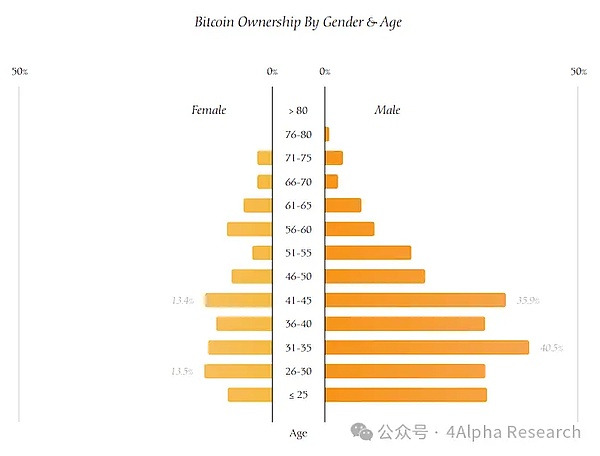
The impact of political leanings on Bitcoin holders
From a political perspective, there is no significant difference between Bitcoin holders and non-holders. Although Bitcoin has been criticized by all political factions since its inception, and has been particularly attacked by the political left in recent years, its strongest supporters tend to be Republicans and libertarians, which has led many people to mistakenly believe that Bitcoin is a a right-wing or libertarian phenomenon. As a result, many believe that Democrats or self-described liberals are less likely to own Bitcoin.
To measure the political leanings of Bitcoin holders, The Nakamoto Project designed five questions to explore respondents' overall political stance, social issues, economic issues, and self-positioning of their own political stance. Although respondents’ responses to these questions varied, the results indicate that the political distribution of Bitcoin holders is very similar to that of non-holders, with most concentrated in the middle of the political spectrum. Bitcoin holders are more likely than non-holders to consider themselves at the extremes, with more identifying themselves as very liberal (+5.7%) or very conservative (+2.3%).
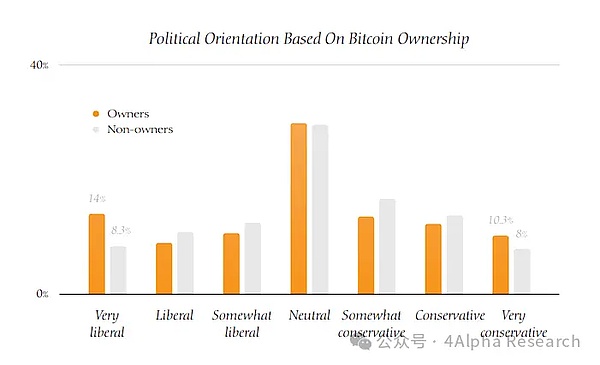
In order to make the political leanings of the respondents clearer, The Nakamoto Project asked the respondents to rate themselves on a scale of 1-10. The lower the score, the more liberal it is, and the conversely, the more conservative it is. Again like non-holders, Bitcoin holders are present across the spectrum, and are more likely to be present at the more extreme segments. But looking at the results, there is no significant difference between Bitcoin holders and non-holders on this scale. Surprisingly, respondents who describe themselves as very liberal are the most likely to own Bitcoin (21.9%), followed by very conservative (17.6%), while centrists are the least likely to own Bitcoin (14.3%).
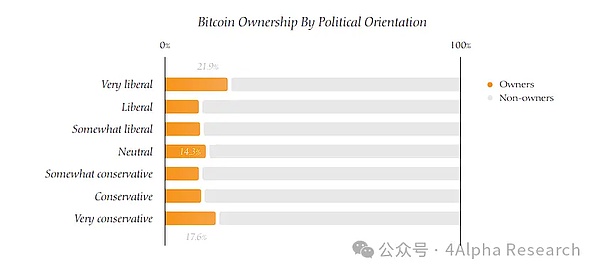
The only significant difference is that libertarians are more likely to hold Bitcoin, although they make up a very small share of the overall respondent population (just 3%). Overall, the political distribution of Bitcoin holders is not significantly different from the overall U.S. population. Politicized statements about Bitcoin ownership by politicians, media elites, and social media users are often misleading, and Bitcoin ownership is not directly related to political factors.
The relevance of ethical foundations to Bitcoin holders
The Nakamoto Project hypothesized that moral foundations might predict whether to hold Bitcoin. To test this hypothesis, they employed moral foundations theory. This theory proposes that human moral reasoning, although innate, changes through learning. The theory initially proposed five core moral foundations: justice, care, loyalty, authority, and sanctity, and later added a sixth foundation—liberty. Different cultures and political ideologies place different emphasis on these foundations, and this difference can explain people's different moral and political tendencies. For example, liberals value justice and caring more, while conservatives value all six foundations more equally.
In this survey, to determine whether Bitcoin holders are more similar to liberals or conservatives in terms of their moral foundations, The Nakamoto Project asked respondents to rate different statements from 1 to 7, with the higher the number. The greater the degree of agreement among the representatives. For example, one statement about "caring" is that "caring for people who are suffering is an important virtue." The survey results show that liberals and conservatives do have some differences in moral foundations, but not as we have always thought. That's a huge difference, but very similar.
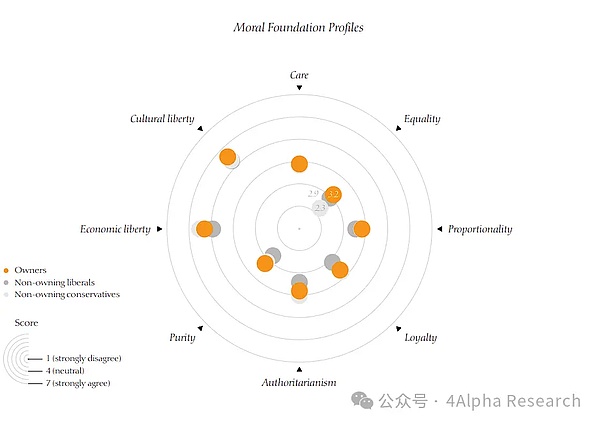
It is worth noting that Bitcoin holders present a unique characteristic, that is, they are more concerned about cultural freedom and equality; they are equivalent to conservatives in holiness and loyalty, equivalent to liberals in caring, and economic freedom and authoritarianism, between liberals and conservatives.
Thus, we can conclude that while Bitcoin holders do not exactly fit the traditional classification of liberal or conservative on moral grounds, they are more inclined to liberal values, especially in the areas of freedom and Justice aspect. At the same time, their positions on other moral foundations range between liberals and conservatives, suggestingthat Bitcoin holders have a unique diversity and complexityin their moral orientations .
Key factors affecting Bitcoin holdings
Although demographic characteristics, political leanings, and moral foundations have little to do with whether a person holds Bitcoin, the survey found four key perceptions that significantly affect whether a person holds Bitcoin:
Trust in Bitcoin’s underlying technology: This includes trust in its security and accuracy.
Knowledge of Bitcoin: Including current understanding of Bitcoin and level of attention to Bitcoin news.
Bitcoin’s utility: Believe in the utility of Bitcoin in daily transactions or investments.
Moral perception of Bitcoin: Believe that Bitcoin technology and users are ethical, and believe that Bitcoin can improve society.
Respondents were asked to agree or disagree with these cognitively relevant statements. For example, a statement targeting trust was “I believe the blockchain is 100% accurate.” The survey results showed clear differences between Bitcoin holders and non-holders on these aspects. Bitcoin holders generally have more confidence in its technology and view Bitcoin as morally positive. Non-holders, on the other hand, show distrust or neutrality.
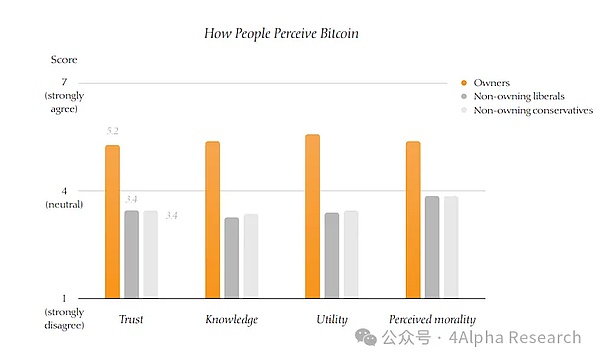
These cognitive factors are key to deciding whether to hold Bitcoin. Understanding Bitcoin technology increases trust in its network, leading to belief in its usefulness and awareness of the social benefits it may bring. These factors may motivate individuals to purchase or invest in Bitcoin. Conversely, it could also be that individuals first purchase Bitcoin and view it as an investment, and as its value grows, they become more interested in the technology behind Bitcoin and become more sympathetic to its practicality and ethics. Although it is impossible to determine which pathway leads to this cognitive change, the overall effect is positive and the causal relationship may be bidirectional.
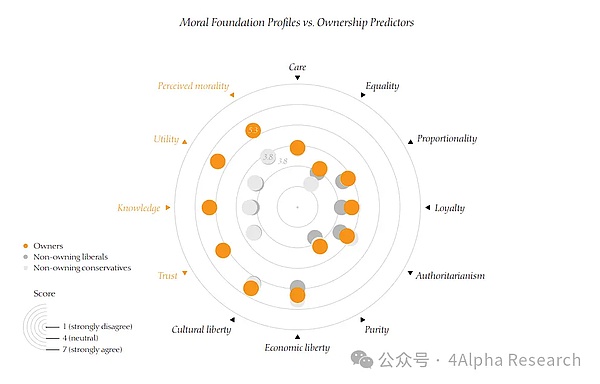
Conclusion
In the past, people often believed that the political leanings of Bitcoin holders affected their choices. However, surveys show that there is no obvious preference for the political stance of Bitcoin holders. Whether liberal, conservative or centrist, there are Bitcoin holders among all groups. The only significant demographic difference is that Bitcoin holders are younger and predominantly male.
Research shows that the ownership of Bitcoin has nothing to do with a specific social or political identity, but is closely related to an individual's knowledge level and awareness of Bitcoin. Bitcoin holders tend to be those who have a deep understanding of the technology, find it useful, trustworthy, and ethically acceptable. This positive attitude drives them to hold Bitcoin, not simple political or social approval.
Ultimately, this shows that Bitcoin's popularity is not limited to a particular political faction or social group, but is driven by an individual's understanding and acceptance of the technology. This also means that Bitcoin’s future development potential depends on public awareness of its value and usefulness, rather than political disagreements.
The content of this article is only for information sharing and does not promote or endorse any business or investment activities. Readers are requested to strictly abide by the laws and regulations of their region and not participate in any illegal financial activities. It does not provide transaction entrances, guidance, issuance channel guidance, etc. for the issuance, trading and financing related to any virtual currency or digital collections.
Reprinting, copying, etc. of 4Alpha Research content without permission is prohibited. Violators will be held legally responsible.
 JinseFinance
JinseFinance
 JinseFinance
JinseFinance JinseFinance
JinseFinance JinseFinance
JinseFinance Edmund
Edmund JinseFinance
JinseFinance JinseFinance
JinseFinance JinseFinance
JinseFinance Beincrypto
Beincrypto Nulltx
Nulltx Bitcoinist
Bitcoinist